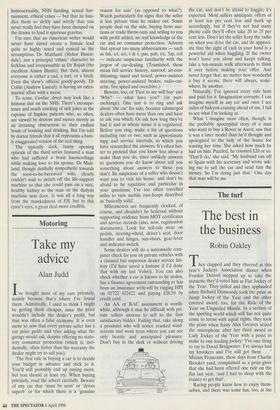Motoring
Take my advice
Alan Judd
I've bought most of my cars privately, mainly because that's where I've found them. Admittedly, I used to think I might be getting them cheaper, since the price wouldn't include the dealer's profit, but that was often a false economy. It is even more so now that every private seller has a car price guide and tries asking what the garage would ask, despite offering no statu- tory consumer protection (which is, inci- dentally, often better than the warranty the dealer might try to sell you).
The first rule in buying a car is to decide your budget in advance and stick to it. You'll still probably end up paying more, but you should at least try. When buying privately, read the advert carefully. Beware of any car that 'must be seen' or 'drives superb' or for which there is a 'genuine reason for sale' (as opposed to what?). Watch particularly for signs that the seller is less private than he makes out. Some people deal on the side, buying from auc- tions or trade throw-outs and selling to you with profit added, no real knowledge of the car and no consumer protection. Adverts that sprout too many abbreviations — such as fsh, s/r, a/c, t & t, pas, pab, r/c, 5sp, o/d — indicate suspicious familiarity with the jargon of car-dealing. (Translated, these mean full service history, sunroof, air-con- ditioning, taxed and tested, power-assisted steering, power-assisted brakes, radio-cas- sette, five speed and overdrive.) Beware, too, of 'First to see will buy' and `Why? — what have you?' (in part- exchange). One test is to ring and ask about 'the car' for sale, because submerged dealers often have more than one and have to ask you which. Or ask how long they've had it and in whose name it is registered. Before you ring, make a list of questions including one or two, such as approximate mpg and service intervals, to which you have researched the answers. It's often bet- ter to pretend that you know less about a make than you do, since unlikely answers to questions you do know about tell you something about answers to those you don't. Be suspicious of a seller who doesn't want you to visit his home, and don't be afraid to be repetitive and particular in your questions; I've too often travelled miles to view mobile rust-heaps described as 'basically solid'.
Mileometers are frequently clocked, of course, and shouldn't be believed without supporting evidence from MOT certificates and service records (also, now, registration documents). Look for tell-tale wear on pedals, steering-wheel, driver's seat, door handles and hinges, sun-visors, gear-lever and indicator-switch.
Some dealers will do a nationwide com- puter check for you on private vehicles with a claimed but unproven dealer service his- tory (I'd have saved a fortune if I'd done that with my last Volvo). You can also check whether a car is known to be stolen, has a finance agreement outstanding or has been an insurance write-off by ringing HPI on 01722 422422 and paying £28.50 by credit card.
An AA or RAC assessment is worth- while, although it may be difficult with pri- vate sellers anxious to sell to the first satisfactory bidder. Failing that, take along a pessimist who will notice cracked wind- screens and worn tyres where you can see only beauty and anticipated pleasure. Don't buy in the dark or without driving the car, and don't be afraid to haggle; it's expected. Most sellers anticipate offers of at least ten per cent less and mark up accordingly, but if they've not had many phone calls they'll often take 20 to 25 per cent less. Don't let the seller keep the radio on when you drive the car, and do appreci- ate that the sight of cash in your hand is a powerful aid when haggling. If the owner won't leave you alone and keeps talking, take a ten-minute walk afterwards to think it over before making your offer. And never forget that, no matter how wonderful a buy it seems, there will always, some- where, be another.
Naturally, I've ignored every rule here and paid for it. Imagination corrupts; I can imagine myself in any car and once I see miles of halcyon cruising ahead of me, I fail to see what I'm looking at.
What I imagine most often, though, is the probably apocryphal story of a man who went to buy a Rover in Ascot, saw that it was a later model than he'd thought and apologised to the lady of the house for wasting her time. She asked how much he had on him. Puzzled, he counted £20 or so. `That'll do,' she said. 'My husband ran off to Spain with his secretary and wrote ask- ing me to sell the car and send him the money. So I'm doing just that.' One day that man will be me.


























































 Previous page
Previous page